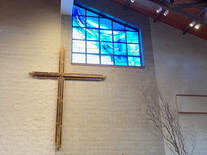Connecting Liturgy to Life
The following is an excerpt from an article written by Kathy Kuczka.
The Preface
My mother was big on thank-yous. Most of her gratitude came in the form of baked goods- scrumptious edibles such as Italian wedding cookies or Polish chruscikis.
She offered these mouthwatering treats to people who constantly showed God’s kindness to us: the family doctor who never took a penny after our father died or the neighbors who plowed our driveway after the massive snowfalls. She recognized God’s goodness in the hearts of others and was eternally grateful. Focusing on the blessings of God rather than the pain of life often changed those potentially sad moments into times of thanksgiving.
Like my mother, the Church continually reminds us through the liturgy to say thank you. The word Eucharist is derived from Greek meaning “thankfulness” and “gratitude”.
At the heart of the liturgy is the thanksgiving offered in the Eucharistic Prayer. The Eucharistic Prayer begins with the Preface, which begins with the priest saying, “The Lord be with you,” and our response, “and with your Spirit.”
There are nearly one hundred Prefaces are in The Roman Missal, each connected to a particular liturgical season, solemnity, or feast. Each line of the Preface draws on what God has done for his people, as Preface V of the Sundays in Ordinary Time, shows:
For you have laid the foundations of the world
and have arranged the changing times and seasons,
You have formed man in your own image and set
humanity to rule of the whole world in all its
wonder, to rule in your name over all you have
made and forever praise your mighty works,
through Christ our Lord.
If we are truly attentive to the reminders of God’s goodness offered in the Preface and in other parts of the Mass, we will have no choice but to be so filled with thankfulness that, like my mother, we will have to pour out our gratefulness onto others.
The Preface
My mother was big on thank-yous. Most of her gratitude came in the form of baked goods- scrumptious edibles such as Italian wedding cookies or Polish chruscikis.
She offered these mouthwatering treats to people who constantly showed God’s kindness to us: the family doctor who never took a penny after our father died or the neighbors who plowed our driveway after the massive snowfalls. She recognized God’s goodness in the hearts of others and was eternally grateful. Focusing on the blessings of God rather than the pain of life often changed those potentially sad moments into times of thanksgiving.
Like my mother, the Church continually reminds us through the liturgy to say thank you. The word Eucharist is derived from Greek meaning “thankfulness” and “gratitude”.
At the heart of the liturgy is the thanksgiving offered in the Eucharistic Prayer. The Eucharistic Prayer begins with the Preface, which begins with the priest saying, “The Lord be with you,” and our response, “and with your Spirit.”
There are nearly one hundred Prefaces are in The Roman Missal, each connected to a particular liturgical season, solemnity, or feast. Each line of the Preface draws on what God has done for his people, as Preface V of the Sundays in Ordinary Time, shows:
For you have laid the foundations of the world
and have arranged the changing times and seasons,
You have formed man in your own image and set
humanity to rule of the whole world in all its
wonder, to rule in your name over all you have
made and forever praise your mighty works,
through Christ our Lord.
If we are truly attentive to the reminders of God’s goodness offered in the Preface and in other parts of the Mass, we will have no choice but to be so filled with thankfulness that, like my mother, we will have to pour out our gratefulness onto others.
